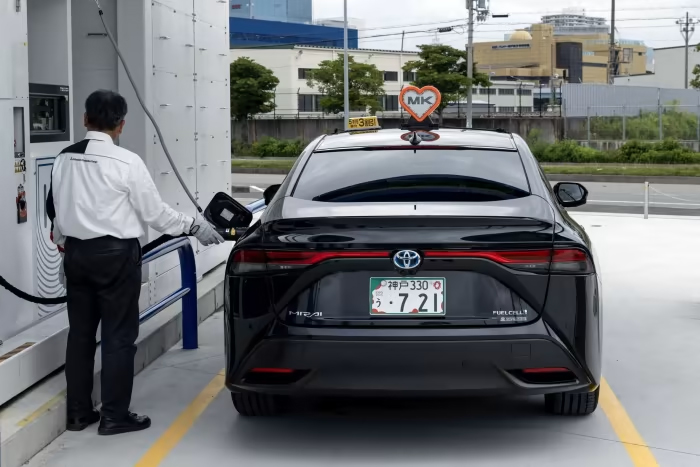
An employee fills up a Toyota hydrogen fuel cell vehicle in Kobe, Japan © Bloomberg
Although US electric car sales are accelerating, hydrogen fuel cell cars have not shared in the riches. This is a growing problem for Toyota, one of the biggest hydrogen car manufacturers. Gillian previously wrote about Toyota's hydrogen efforts, and while I was in San Francisco this week, I set out to investigate the market by touring local fuel stations.
California is the only state with hydrogen stations for cars. In downtown San Francisco, there are only two (both are operated by Shell). At one of these Shell stations (around the corner from Airbnb's headquarters), a station attendant told me about 10 to 15 cars will fuel up with hydrogen during the course of an eight-hour shift. One driver who spoke with me said she bought her hydrogen-powered Toyota Mirai two years ago - and actually cancelled a Tesla order to buy it. (She declined to give her name. I would too if I were approached by a stranger in a dingy Shell station.)
But she said she was happy with her car purchase despite two problems. One being that the hydrogen fuel stations often run out of gas. She said a state website for hydrogen fuel might show the Shell stations have gas, but by the time you arrive at the station it can be gone. At other times, hydrogen fuel stations can go down for maintenance.
The other big problem is that the cost of hydrogen fuel has almost doubled from about $16 per kilogramme in July 2022, according to S&P data. To boost sales, Toyota had been giving away a whopping $15,000 worth of hydrogen - a major reason for my driver friend's reason to buy her car. The Mirai driver said she estimated she could have driven for four years for free with the $15,000 from Toyota. But now that is down to about two years, she said. That afternoon, she spent $96 for 3.21kg of hydrogen - way more than it would cost to fill a car with petrol. Toyota has said its Mirai cars can get 350 to 400 miles of driving range on a full tank.
Jack Brouwer, an engineering professor at University of California Irvine who has worked for years on hydrogen issues, told me the reason the cost of hydrogen had surged is that state subsidies are being gobbled up by big businesses jumping into sustainable energy, such as biodiesel. These businesses "took all of the credits" that had been going to companies making and distributing hydrogen, he said. California's legislature and governor know about this problem in hydrogen subsidies but for now it hasn't been fixed. "Eventually, the sh*t is going to hit the fan," Brouwer added.
Problems with infrastructure and hydrogen pricing will become more significant as California races to halt sales of new petrol-powered vehicles by 2035. If all of the state's cars needed to be charged, California's electrical grid would collapse, Brouwer said. Cities like Los Angeles simply cannot handle charging more and more cars and cope with all other electrical needs. California needs hydrogen cars to even out electricity demands.
Finally, all of this is a big problem for Toyota. Its hydrogen car sales are flat - exactly because of the high prices and infrastructure challenges in California. Now, the company is eyeing Europe and China as healthier markets for its hydrogen cars. If Toyota foregoes its hydrogen strategy in the US, will California continue investing in a hydrogen fuel infrastructure? It is a major chicken-and-egg situation that we will continue to follow. (Patrick Temple-West)